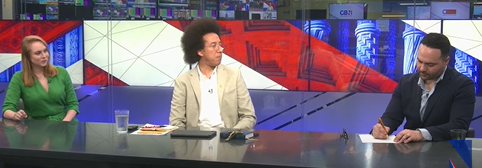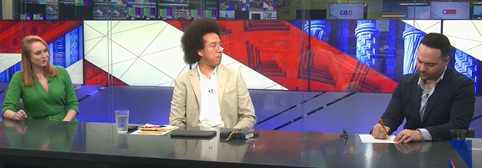Calvin Robinson And Shakeel Afsar Clash Over British Muslims Disrupting Screening of The Kerala Story

The argument between Shakeel Afsar and Calvin Robinson centers around British Muslims protesting and causing disruptions at a movie screening of the film ‘The Kerala.’ Afsar strongly believes that while they support freedom of speech, they cannot stay silent when a film promotes violence against their community.
The film ‘The Kerala’ contains content that Muslims find offensive and potentially harmful. In response, a group of British Muslims decided to protest outside the screening venue to show their disagreement.
Afsar’s position is that freedom of speech should have limits when it puts a community in danger. He argues that when a film promotes violence or targets a specific group, it can reinforce negative stereotypes and create tensions within society. Afsar believes it is important to hold accountable those who create content that threatens social harmony.
On the other hand, Calvin Robinson takes a different view. He believes in protecting freedom of speech as a fundamental right in a democratic society. Robinson argues that limiting artistic expression, even if it is offensive, sets a dangerous precedent and restricts individual liberties.
Below is their Conversations
“A group of British Muslims caused a stir this week after holding a demonstration outside a screening of a Bollywood film in Birmingham. The Corella story has been slammed by some Muslim critics for its portrayal of Islamic culture in the eponymous Southern Indian state, which in itself has triggered a backlash from defenders of freedom of speech and expression. So, where should the lines between free speech and Islamophobia be drawn, and are protesters justified? Joining me now is my sidekick Emma Webb and my other sidekick Aaron Bastani.

Aaron: I would say that this is entirely a free speech issue. There is no such thing as Islamophobia, and if there is, this isn’t it.
Emma: Oh yeah, there’s a lot of claims that… I mean, we wouldn’t have a show. So, is there Islamophobia? I don’t think this is Islamophobia. Um, I do think the film should be allowed to screen. I don’t think that for a moment, obviously, these people have a right to protest. It’s interesting that you can protest, but the film itself has actually… And I would implore your audience to read a little bit about this. Yeah, it is claiming to be based upon true events, but it’s not remotely accurate. So, for instance, like every other film, well, it says 32,000 people in Kerala joined ISIS, when actually in reality, it was about 1200 Indians joined ISIS. And it’s been condemned by the Indian Congress party in India. It had to remove some of its promotional materials because they were so inaccurate. Right. And I think the issue is people go to watch this film, like you’ve hinted at there, it’s a dramatization, and it’s being presented as a fact. So how is this any different from The Crown?
Aaron: That’s a good point. But I suppose if you had something like The Crown, which was potentially stirring sectarian dislike and enmity, then I think it’d be an interesting conversation. I don’t think that means you don’t screen it. I think you probably broadcast it with a caveat. This is a dramatization. This is not a real-life story. Okay? It’s like saying, you know, contextualize it. I think so. It’s like watching Rambo and thinking, actually, there’s one guy who took on the entire Russian army in Afghanistan in the 1980s. It’s nonsense. But it’s like doing that and saying, “Action is based on a true story.” Quite dangerous as well, given the broader politics.
Emma: To add some clarity to what I said earlier, I think Islamophobia is a word that’s often used to shut down debate, to shut down free speech. And I think this is a prime example of that. Absolutely. It’s a euphemism for blasphemy requirements, isn’t it? I mean, we’ve seen it time and time again. We saw it with Charlie Hebdo. Those cartoons were apparently blasphemous, so some people thought they were entitled to murder as a result of that. We saw the same thing with The Lady of Heaven, which was another film that was shut down.
I believe also the same people who were behind this protest were also leading that protest as well. So, we have groups of people at home and also abroad. We’ve seen this in many cases, the Danish cartoon affairs. Salman Rushdie, obviously, that was a problem that never went away because he was recently attacked even though the fatwa was put on his head many, many years ago.
So, this is a problem that has not gone away, and Islamophobia has essentially become a catch-all term to suppress any criticism or scrutiny of Islam or Islamic practices. It’s often used as a shield to deflect legitimate concerns and to silence those who question certain aspects of the religion or its interpretations.




